POETS’ Education Program Introduces Students of All Ages to Interdisciplinary Research in Electro-Thermal Systems
August 31, 2017
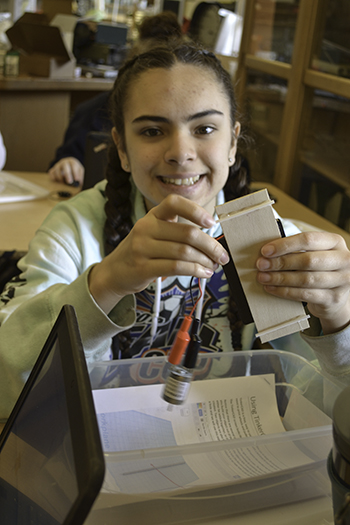 A Uni High student works on a solar car design during a test run of a POETS RET curriculum module.
A Uni High student works on a solar car design during a test run of a POETS RET curriculum module. In addition to cutting-edge research in electro-thermal systems, the NSF-funded POETS (Power Optimization for Electro-Thermal Systems) Engineering Research Center has educational programs that expose students (as well as the teachers) to POETS’ research via educational activities, research, and courses that foster interdisciplinary collaboration and expose learners to the unique research that takes place in the Center.
Since POETS is comprised of four partner institutions—Illinois (the lead institution), as well as Arkansas, Howard, and Stanford universities— its educational offerings are unique in that the programs vary across the different institutions based upon leaders and personnel, research being conducted, and other university programs available. According to Jessica Perez, POETS’ Associate Director of Education and Inclusivity, the goal isn’t to make everything identical across the different institutions, but programs are “different at every university because every university has strengths that we would like to leverage. However, we do hope that they have a similar experience throughout all of the programs.” She claims the goal is to “give each university similar experiences.”
POETS is specifically targeting three groups of students: K–12 students (and their teachers), undergraduates, and graduate students, with several programs, activities, or emphases in place for each student group.
K-12 Students
Research Experience for Teachers (RET). One way to impact students is vicariously through teachers; so POETS’ RET programs bring middle school and high school teachers to the universities to focus on either research, curriculum development, or a combination.
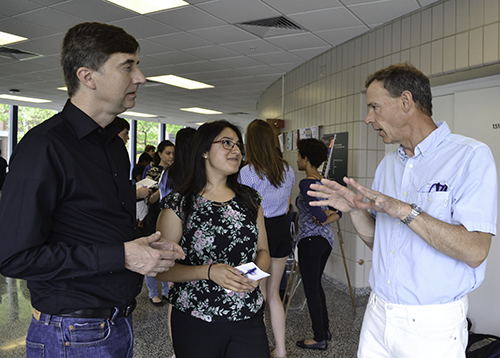 Left to right: Joe Muskin and Jessica Perez listen as Uni High science teacher, David Bergandine, explains his heat pipes curriculum during POETS’ 2017 High School Student Research Symposium.
Left to right: Joe Muskin and Jessica Perez listen as Uni High science teacher, David Bergandine, explains his heat pipes curriculum during POETS’ 2017 High School Student Research Symposium.For example, at Illinois and Arkansas, teachers focus solely on curricular development. After being introduced to POETS and its research, they then focus on developing a product. Stanford’s program, however, is a traditional RET: embedded into a research lab, teachers are trained in laboratory safety, do experiments, analyze data, and give a poster presentation summarizing their research. But they also get together with the other teachers to design a curriculum around what they learned.
While there is enough funding for stipends for eight teachers (two at each university), in the summer of 2017, some schools (Howard and Stanford) could only host one teacher; thus, Arkansas had three RET teachers, while Illinois had six half-time teachers.
Since the RETs across the partners are structured differently, to unify the program, the goal is to develop a multi-week curriculum related to POETS research and comprised of modules the different RET teachers develop.
So in Illinois’ RET, a team of local science teachers has been tasked with creating a multi-week curriculum unit related to power, heat, and power density that’s aligned with Illinois’ Next Generation Science Standards.
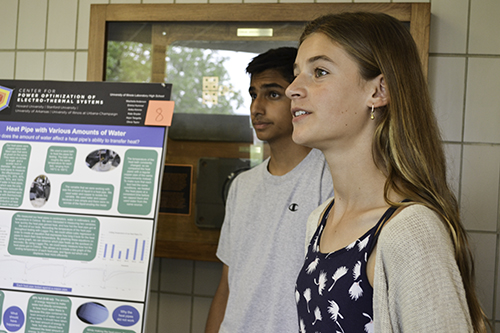 A Uni High student presents her team's research on heat pipes during POETS’ 2017 High School Student Research Symposium.
A Uni High student presents her team's research on heat pipes during POETS’ 2017 High School Student Research Symposium.To do a test run on the curriculum developed so far, in spring 2017, teachers from Illinois’ 2016 RET team tested the curricula they had written with their students. For example, David Bergandine’s chemistry students at Uni High did research projects testing twelve different variables about heat pipes. While gaining general knowledge related to heat flow and heat transfer, and some in-depth knowledge about the specific area they researched, students not only learned what research is like, but got to present their research at POETS’ 2017 High School Student Research Symposium (see istem article).
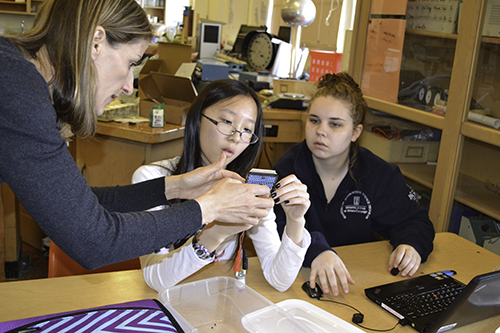 Sharlene Denos (left) works with two Uni High students on their solar car design as part of a POETS RET curriculum module.
Sharlene Denos (left) works with two Uni High students on their solar car design as part of a POETS RET curriculum module.Another module about solar cars was tested in two local schools this past spring: at Uni High in Sharlene Denos’ class, and in Bryant Fritz’s class at Next Generation School (see istem article). Then this past summer, both returning and new POETS’ RET teachers worked to refine the 2016 modules and add new material to the multi-module unit.
Although during the first year of the program, teachers were encouraged to pick a topic related to POETS research and develop a module, the long-term goal is to foster cross-partner collaboration in developing the curriculum. “Now that we have some units already started,” Perez suggests, “where can we bridge those units together? Can we fill in some of the gaps?”
So the goal over the next couple of years is to foster collaboration between partner universities.
Also, Perez shares a tentative plan for how the unit should be structured. At the beginning, students would watch a video of a thermal-related issue (i.e., hoverboards exploding or Samsung phones catching fire), then be asked: “What happened?” and “Why?” Students would then pose questions related to why it had happened, hopefully related to heat, batteries, and how power works.
“So if we get to these questions,” Perez explains, “we can start understanding why this device messed up.” Students would then explore those questions with the end goal of creating something, where “hopefully they circle back to that first question. That’s sort of the loose plan,” she say, “but how we’ll get there, we’re still figuring out.”
Perez is excited about the RET because traditionally, RET teachers develop their own curriculum to implement in their own classrooms. “There’s a limit to how much it is shared,” she admits. But RET planners believe cultivating cross-institutional collaboration among the partners, who are in very different communities, could “create a curriculum that has mass appeal across different communities.” Plus, when POETS is gone, “We still will have something that will last, that people can continue to use.”
Perez believes cross-partner collaboration is key: “This is very unique because it involves multiple universities collaborating on one curriculum. But I think that could also be very powerful because, this next year, when we start trading curriculum and people start testing out stuff that we did in Illinois in the D.C. area, or in Arkansas, maybe we’ll learn things that we didn’t know. They’re very different populations, so maybe there are going to be certain things that they have trouble with that we didn’t know, and vice versa. So we can start creating curriculum that is more universal.”
Though POETS is currently funded for five years, with the possibility of funding for five additional years, Perez is already planning ahead. She says for the first five years, they’re focusing on a middle school, multi-week curriculum, and then will focus on developing a high school curriculum the last five years.
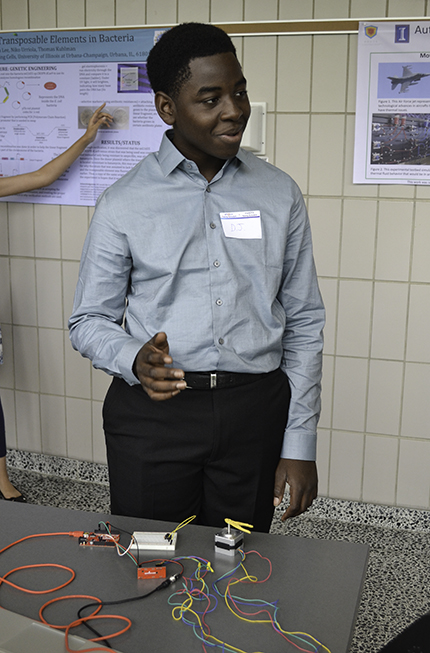
POETS Young Scholar Darius Jackson presents his research at the Young Scholars Poster Session..
Young Scholars Program. During summer 2017, twelve local high school students found out what research is like while working in Illinois labs studying things like condensation heat transfer and thermal fluid testing.
Run by POETS and Illinois’ Physics Department, the new Young Scholars Program provided students a six-week summer research opportunity where they experienced authentic, cutting-edge research in some of Illinois’ premier research labs. The goals of the program were to help students discover what research is actually like and whether it might be in their futures, and to give them an idea of what college is like (see istem article).
Perez indicates that the program recruited minority students with a preference for first-generation students (students whose parents hadn’t gone to college). Of the twelve participants, half were young women, who are generally underrepresented in STEM fields.
Undergraduate Students
POETS Research Experience for Undergraduates (REU). Four undergraduate students, one at each of the four universities, learned about electro-thermal systems research this summer as part of POETS’ 10-week REU. And because students were placed at four different institutions, they each had unique opportunities as POETS took advantage of the various offerings at each of the schools.
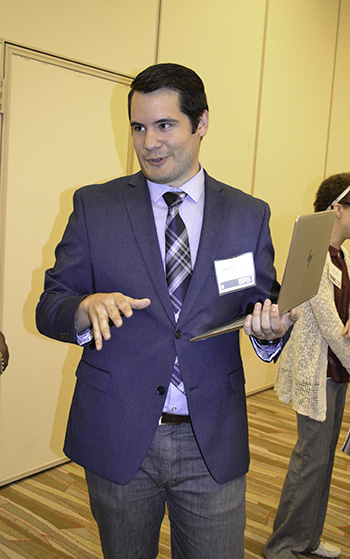 POETS REU student, Adam Castaneda presents his research at the Illinois Summer Research Symposium.
POETS REU student, Adam Castaneda presents his research at the Illinois Summer Research Symposium. “So the program looks very different at the different schools,” says Perez, “but we’re hoping that we can unify them through POETS, through the different things that we do.”
POETS’ goal is to “broaden the participation of students going into graduate school,” says Perez, and to “help some of these high-achieving minority students continue on their track and get them interested in doing research…Through the program, we’re hoping to increase their confidence in doing research; getting comfortable in a lab environment; interacting with professors; and understanding how to go about doing the research process, like how to ask questions and how to set up experiments to answer those questions and getting some of that confidence.”
The program recruited students “from a racial minority that also had some type of need,” Perez explains. “Maybe their family didn’t go to graduate school, for example. Having this exposure is going to be more valuable to someone who didn’t get that experience.”
Perez say they were also hoping students would “develop a mentor/mentee relationship with their research mentor,” either the faculty member or graduate students in the lab (see istem article).
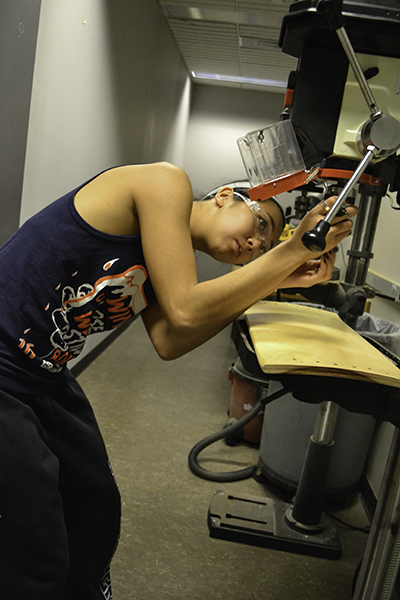 An engineering student in ENG 198 uses a drill press on her team's project.
An engineering student in ENG 198 uses a drill press on her team's project. First-Year Design Course on Personal Mobility. POETS’ engineering design course, ENG 198, piloted in fall 2016, is designed to give freshmen a chance to discover what it’s like to be an engineer early on. Working as part of an interdisciplinary team, they are to come up with an innovation of benefit to society in the area of personal mobility. The goal is for students to learn the engineering process, experience teamwork, and come up with an end product that lets them experience having contributed to society.
The joint IEFX/POETS course is similar to other projects courses: teams of 3–5 students have a budget of $200–300 and a timeline of 8–9 weeks to complete a project that's a useful innovation. What’s unique is that the innovations are to be related to a specific theme: personal mobility (see istem article).
Interdisciplinary Senior Design Capstone course. Slated to be piloted in fall 2017, this course will address the siloing inherent in many senior design courses. (A silo is a system in which personnel in one field are incapable of collaboration with others that are, or should be, related.)
“They are trained to work independently,” Perez explains, “and because of that, they have a hard time exchanging ideas, because they’re stuck in that lingo. So the idea was that if, in the real world, all the engineers come together and work together anyways, why not introduce an opportunity for the students while they’re in school to start working on design projects together.”
So in this course, electrical and mechanical engineers will work together on a similar project and have similar curriculum that will teach them how to better communicate across disciplines.
Graduate Students
One of POETS’ graduate student education goals is to train graduate students, through doing research in POETS’ labs, to go out into the workforce. According to Perez, because of POETS’ multi-institution emphasis, graduate students’ experiences are unique across the different institutions. “But we’re hoping that we can at least bridge their experiences enough that they understand what POETS is and that they feel connected to the Center as a whole.” Because grad students are “here for the long run,” she continues, “if they feel connected to the Center, then that helps drive the collaboration on the research side to make sure that we’re breaking down those silos and that the different disciplines are talking to one another and collaborating effectively.”
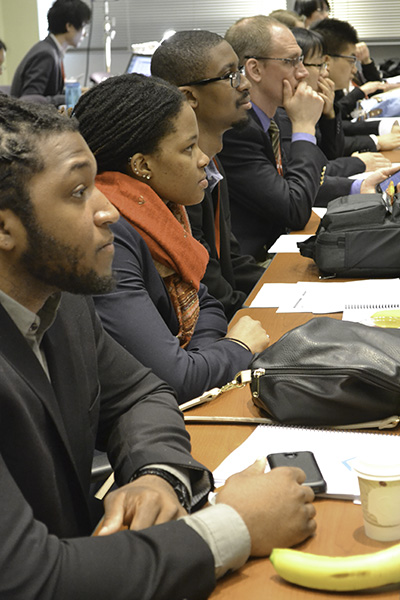 POETS graduate students attend a workshop on outreach during the 2017 NSF site visit.
POETS graduate students attend a workshop on outreach during the 2017 NSF site visit.T-Shaped Engineers. One of PI Andrew Alleyne’s goals for POETS is to produce T-shaped engineers who are comfortable in an interdisciplinary environment. They would have depth in one area (“You go to grad school to gain some depth and become an expert in a particular area,” Alleyne acknowledges). But he also envisions students with breadth—”experts, but…relatively broader than the average engineer.”
To achieve this, students work on interdisciplinary teams to address cross-discipline research projects in their labs. Another thing he envisioned, which has been implemented at POETS’ space at Illinois, was changing the physical layout of the offices where grad students work—bringing the walls down and having them in one large space rather than having them off in separate cubicles, which would encourage collaboration between people.
In-Person and On-line Connectons. But Perez indicates that they are also working to connect graduate students to POETS at large. POETS has two strategies to “break down some of those boundaries of all the miles between us…and to bring the students together,”
Perez explains. One is through meetings POETS personnel attend “in person,” such as the annual NSF site visit, “a great opportunity for the students to meet together, interact, learn about each other’s research, and we start forming some relationships with them,” Perez explains.
Everyone also gets together again at the annual meeting, which, since NSF isn’t there, has more of an inward focus. Similar to a conference, POETS faculty and students give research presentations and talks about where the program is going.
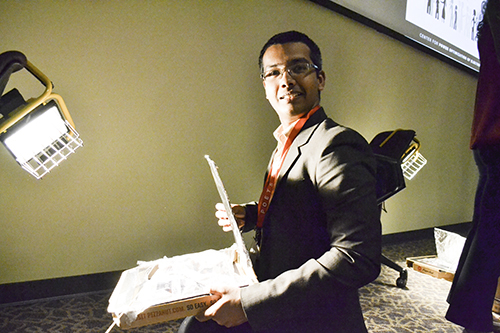 A POETS graduate student places the pizza box solar oven he and his teammates created in an optimal spot for "baking" during a 2017 workshop on outreach for POETS grad students.
A POETS graduate student places the pizza box solar oven he and his teammates created in an optimal spot for "baking" during a 2017 workshop on outreach for POETS grad students.Another way students get to know each other is via webinars. “They share their research; they teach people about a research topic in terms of an overview,” says Perez
Another strategy Perez and a colleague more or less stumbled upon was holding a town hall meeting for students. They had been grappling with how to best serve the grad students, and needed answers to questions regarding: “What sort of programs should we give them? What sort of education things do they want? How do they want to get more involved in industry?”
So they held a town hall to collect ideas, “But it kind of turned into this thing where the graduate students got together and figured out, ‘What are some of the things that can improve POETS in general and improve our experience?’” Some things they brought up included communication: they meet in person periodically, but there’s a need for connecting throughout the year. How can that be done? Suggestions included a student retreat where students could get together and interact informally, and improving connectedness between students at the individual university levels. Unlike at Illinois, the other partners don’t have a space dedicated to POETS. So one of the issues mentioned was, “How do the other schools connect if they don’t have a common place like this?”
Student Leadership Council. POETS also has a strong Student Leadership Council composed of graduate students, which has officers, a technical conference leader who runs the technical conference, plus student representatives at each university. “Every university is represented in that committee, and they make decisions about how things should move forward with the graduate students as a whole and also they interact with the management team to voice the graduate students’ concerns.” While the Council runs things like the annual technical conference (another way students connect), plans are in the works for the Council to lead initiatives to improve connections between students, including social events at individual universities which are connected across universities and communication tools so students can interact informally and exchange research ideas.
Story and Photos by Elizabeth Innes, Communications Specialist, I-STEM Education Initiative
More: 6-8 Outreach, 8-12 Outreach, Funded, Graduate STEM Outreach, Next Generation School, POETS, RET, REU, Summer Research, Underserved Students/Minorities in STEM, University Laboratory High School, 2017
For additional I-STEM articles about POETS, see:
- POETS’ REU Exposes Undergrad Students to Electro-Thermal Systems Research
- Young Scholars Program Exposes Local High School Students to Research, the University
- Uni High Students Research Heat Pipes as Part of POETS’ RET Curriculum Development
- Local 8th Graders Build Solar Cars Courtesy of New POETS' RET Curriculum
- POETS Seminar, ENVISION, Seek to Get Grad Students Hooked on Outreach
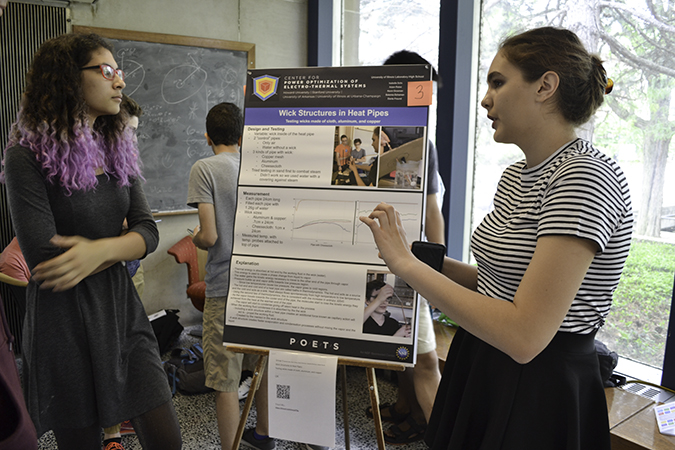 Two Uni High students present their research project about heat pipes as part of David Bergandine's POETS RET curriculum module development.
Two Uni High students present their research project about heat pipes as part of David Bergandine's POETS RET curriculum module development.












.jpg)
















